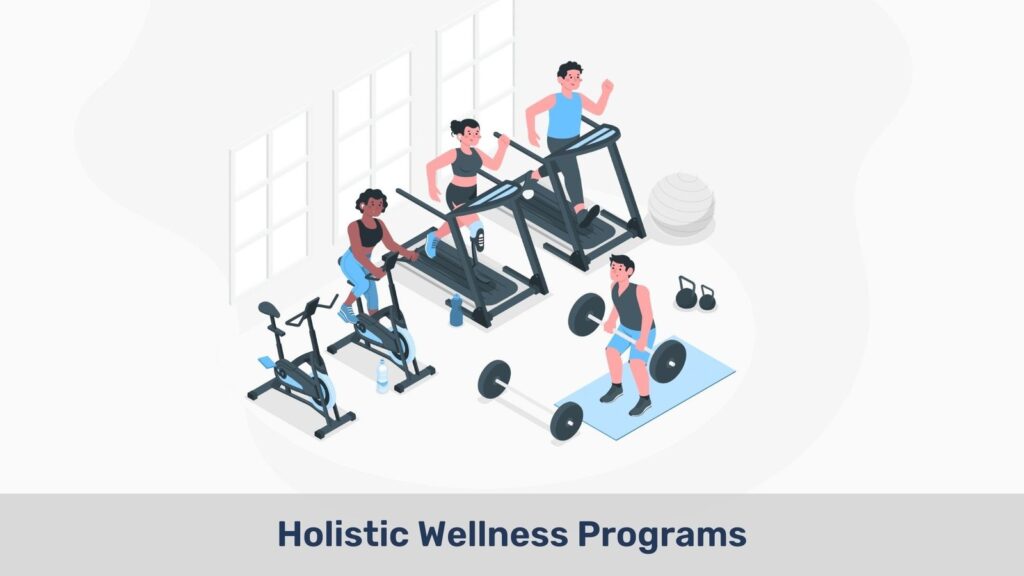Introduction
In the evolving era of the modern workplace, the concept of employee wellness has transcended traditional health initiatives to encompass a more comprehensive approach—holistic wellness programs. Recognizing that employees are multifaceted beings with interconnected dimensions, organizations are increasingly embracing holistic wellness strategies to promote a healthier, happier, and more engaged workforce.
Holistic Wellness Meaning
Holistic wellness is a paradigm that addresses the complete well-being of individuals by considering various dimensions, including physical, mental, emotional, social, and occupational aspects of their lives. Unlike traditional wellness programs that may focus solely on physical health, holistic wellness recognizes the intricate interplay between different facets, aiming to create a harmonious equilibrium for employees.
Statistics on Workplace Stress and Well-being:
Work-related stress remains a pervasive issue, impacting employee health and organizational performance.
-
- The American Institute of Stress reports that stress-related absenteeism costs businesses in the United States over $300 billion annually, underscoring the financial implications of neglecting employee well-being.
- Moreover, a study published in the Harvard Business Review found that 61% of employees believe their work negatively impacts their health, contributing to increased stress levels and burnout.
The Evolution of Holistic Wellness Programs:
As workplaces adapt to changing societal norms and employee expectations, the evolution of holistic wellness programs becomes evident. Employers are no longer viewing wellness as a mere perk but as an integral part of their organizational culture. This shift is reinforced by the Global Wellness Institute, which estimates that the global workplace wellness market is poised to reach $90 billion by 2026.
In this dynamic context, this exploration into holistic wellness programs aims to delve into the various dimensions of employee well-being, shedding light on the strategies, benefits, and real-world impact of adopting a holistic approach in the workplace.
Subsequent sections of this article will delve deeper into the implementation of holistic wellness programs and the tangible benefits they bring to both employees and employers.
Holistic Approach to Wellness
A holistic approach to wellness is a comprehensive and integrated perspective that considers the interconnected nature of various dimensions of well-being. Rather than focusing on one specific aspect of health, a holistic approach recognizes that physical, mental, emotional, social, and even spiritual elements are interrelated and collectively contribute to an individual’s overall sense of wellness. This approach emphasizes the importance of achieving balance and harmony in all areas of life for optimal health and fulfillment.
Key principles of a holistic approach to wellness include:
- Addressing Multiple Dimensions: Holistic wellness acknowledges that well-being is influenced by various factors. These 9 dimensions of wellness may include physical health, mental and emotional well-being, social connections, occupational satisfaction, financial stability, environmental awareness, and spiritual fulfillment.
- Preventive and Proactive Measures: Rather than solely addressing health issues reactively, a holistic approach encourages preventive measures. This involves adopting lifestyle choices that promote overall health and prevent the onset of illnesses or imbalances.
- Individualized and Personalized Care: Holistic wellness recognizes that each person is unique, with different needs, preferences, and challenges. Therefore, interventions and strategies are tailored to the individual, taking into account their specific circumstances and goals.
- Mind-Body Connection: This approach emphasizes the interconnectedness of the mind and body. Mental and emotional well-being can have a direct impact on physical health, and vice versa. Practices like mindfulness, meditation, and stress management recognize and promote this mind-body connection.
- Promotion of Self-Awareness: Holistic wellness encourages individuals to be self-aware and in tune with their own needs, feelings, and experiences. This self-awareness allows individuals to make informed choices that align with their values and contribute to their overall well-being.
- Balancing Lifestyle Factors: Achieving balance in various aspects of life is a central theme in holistic wellness. This may involve balancing work and personal life, maintaining a balanced diet, and integrating physical activity, relaxation, and social connections into daily routines.
- Cultivating Positive Relationships: Recognizing the importance of social connections, a holistic approach encourages the cultivation of positive relationships with friends, family, and the community. Strong social support is considered a vital component of overall well-being.
- Holistic Healing Modalities: Holistic wellness may incorporate a wide range of healing modalities, including alternative and complementary therapies such as acupuncture, chiropractic care, massage, herbal remedies, and energy therapies. These are often used alongside conventional medical approaches.
What is a Holistic Wellness Program?
A holistic wellness program is a comprehensive approach to promoting well-being that addresses various aspects of an individual’s life. Rather than focusing solely on physical health, holistic wellness programs consider the interconnectedness of different dimensions, including mental, emotional, social, and even occupational well-being. These programs aim to improve overall quality of life by recognizing and nurturing the whole person.
The goal of holistic wellness programs is to create a supportive and inclusive environment that empowers individuals to take charge of their well-being in various aspects of their lives. Organizations implement these programs not only to enhance the health and happiness of their employees but also to improve productivity, reduce absenteeism, and promoting positive workplace culture. By addressing multiple dimensions of wellness, these programs aim to create a balanced and thriving work environment.
Supporting Holistic Wellness for Your Employees
Supporting holistic wellness for employees involves creating a workplace culture and implementing programs that address various aspects of well-being, including physical, mental, emotional, social, and even financial health. Here are several strategies to support holistic wellness for employees:
Flexible Work Arrangements:
-
- Provide flexible work schedules or remote work options to support work-life balance and reduce stress.
- Allow employees to take breaks during the workday for physical activity, relaxation, or self-care.
Mental Health Support:
-
- Offer Employee Assistance Programs (EAPs) that provide confidential counseling services for employees dealing with stress, anxiety, or other mental health concerns.
- Promote a stigma-free environment where employees feel comfortable discussing mental health and seeking help when needed.
Health Benefits:
-
- Provide comprehensive health insurance that covers mental health services, preventive care, and wellness programs.
- Consider offering additional benefits such as gym memberships, nutrition counseling, or mindfulness apps to support employees’ physical and mental health.
Educational Workshops:
-
- Conduct regular workshops on topics related to holistic wellness, including stress management techniques, nutrition, financial literacy, and mindfulness.
- Bring in experts to lead sessions on topics like resilience, emotional intelligence, and effective communication.
Leadership Support:
-
- Encourage leadership to actively promote and participate in wellness initiatives, setting a positive example for the entire organization.
- Train managers to recognize signs of stress or burnout in their teams and provide support or resources as needed.
Workplace Environment:
-
- Design a workplace that promotes physical health, such as providing ergonomic workstations and creating spaces for relaxation or physical activity.
- Introduce initiatives to promote sustainability and environmental wellness within the workplace.
Financial Wellness Programs:
-
- Offer resources and workshops on financial planning, budgeting, and managing debt to support employees’ financial well-being.
- Consider providing access to financial advisors or tools that help employees plan for their future.
Need for Holistic Wellness Programs in the Workplace
The need for holistic wellness programs in the workplace has become increasingly apparent due to several factors that impact both employees and organizations. These programs address a broader spectrum of well-being, recognizing that individuals are multidimensional beings with interconnected physical, mental, emotional, social, and even spiritual aspects. Here are some compelling reasons highlighting the need for holistic wellness programs in the workplace:
-
- It provides tools and strategies for stress management, mindfulness, and emotional resilience, promoting mental well-being.
-
- It can lead to improved focus, creativity, and overall job satisfaction, positively impacting individual and collective performance.
-
- By promoting preventive healthcare and healthier lifestyles, it can help reduce the frequency of illnesses and, in turn, lower healthcare costs for both employees and employers.
-
- These programs contribute to higher employee retention rates by creating an environment where individuals feel valued and cared for.
-
- As work environments evolve, including remote and hybrid work arrangements, holistic wellness programs adapt to meet the changing needs of employees. Programs that incorporate flexibility and accommodate diverse lifestyles contribute to the overall well-being of a dispersed workforce.
-
- Holistic wellness programs often include initiatives that promote work-life balance. This helps employees manage their professional and personal lives more effectively, reducing burnout and contributing to long-term job satisfaction.
Holistic Wellness Programs Examples
Holistic wellness programs can take various forms, and their design often depends on the specific needs and goals of the organization and its employees. Here are some examples of components commonly found in holistic wellness programs:
- Fitness classes: Offering on-site or virtual fitness classes, such as yoga, pilates, or group exercise sessions.
- Nutrition workshops: Providing education on healthy eating habits, meal planning, and nutritional choices.
- Health screenings: Conducting regular health check-ups and screenings for employees to monitor key health indicators.
- Counseling services: Providing access to counseling or mental health support services for employees.
- Social events: Encouraging socialization through activities like team lunches, happy hours, or community volunteering.
- Ergonomic assessments: Ensuring that workspaces are optimized for employee comfort and health.
- Employee financial assistance programs: Providing resources or counseling for employees facing financial challenges.
- Mindfulness and meditation sessions: Introducing practices to promote self-reflection, mindfulness, and relaxation.
- Wellness challenges: Organizing friendly competitions focused on various aspects of well-being, such as step challenges or healthy eating contests.
- Incentive programs: Providing rewards or recognition for employees who actively participate in wellness initiatives.
Final Thoughts
Holistic wellness programs offer a transformative approach to nurturing the overall well-being of individuals, recognizing the interconnected nature of physical, mental, emotional, social, and even spiritual dimensions. By embracing such programs, organizations can cultivate a workplace culture that not only prioritizes employee health but also contributes to increased engagement, productivity, and satisfaction.
At Woliba, we understand the importance of holistic wellness in today’s dynamic corporate landscape. Our expertise lies in tailoring comprehensive programs that address the unique needs and goals of your workforce. From fitness initiatives and stress management workshops to social engagement activities and career development programs, we are committed to fostering a culture of well-being within your organization.
Contact us now to embark on a journey towards a healthier, happier, and more productive workplace. Let Woliba be your partner in creating customized holistic wellness programs that empower your employees to thrive both personally and professionally.









